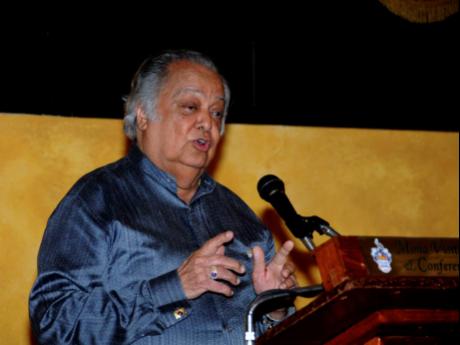Elizabeth Morgan | Sir Shridath Ramphal – A regional trade advocate
Since the death of Sir Shridath Surendranath ‘Sonny’ Ramphal, at age 95, on Friday, August 30, in Barbados, there have been many tributes from across the Caribbean and the world. He will be accorded an official funeral in Guyana, the country of his birth, on Saturday, September 14.
His work with the then Caribbean Regional Negotiating Machinery (CRNM), established in 1997, was known to me as he was the first director general. From the tributes, what struck me was Sir Shridath’s wider involvement as an advocate in regional and international trade.
REGIONAL TRADE PROMOTION
In the 1960s, Ramphal was involved in the creation of the Caribbean Free Trade Area (CARIFTA) as it was recognised, following the demise of the Federal Experiment, that the West Indian countries and territories needed to cooperate to improve production and trade within the region, fostering economic integration.
In 1973, with Britain joining the European Economic Community (EEC), it was further recognised that the Caribbean West Indian countries and territories need to deepen their regional integration. As Guyana’s minister of foreign affairs, Shridath Ramphal was involved in the creation of the Caribbean Community (CARICOM) and was present at the meeting in July 1973, when the Treaty of Chaguaramas was signed.
A major development for the region, often overlooked, was the creation of the African, Caribbean and Pacific (ACP) group of states. It was then felt that to negotiate a trade and development agreement with the EEC, the former colonies (46 countries), would be stronger unified as an alliance. That alliance was created in Guyana in June 1975 when the Georgetown Agreement was signed, creating the ACP Group of States. The ACP went on to negotiate the first Lomé Convention with the EEC, which was then considered a very progressive model of North–South cooperation covering aid and trade.
VULNERABILITIES OF SMALL STATES
At the Commonwealth Heads of Government Meeting held in Kingston, Jamaica, April 29 – May 6, 1975, Shridath Ramphal was appointed the second Commonwealth Secretary General, a post he would hold until June 1990. While the Commonwealth’s focus was then more political, the organisation, in the 1980s, began its focus on the vulnerabilities of small states, which included their dependence on trade.
ADVANCING REGIONAL INTEGRATION
From 1975 to the end of the 1990s, with CARICOM in stagnation, from the CARICOM Heads of Government Conference held at Grand Anse in Grenada, two major decisions for the advancement of regional integration emerged.
One was the establishment of the West India Commission chaired by Sir Shridath which produced the report titled ‘A Time For Action’, with recommendations on advancing regional integration. Coming from these recommendations was the establishment of the Association of Caribbean States to foster closer cooperation with all countries of the Caribbean.
Also emerging from the Grand Anse conference was the framework for the creation of the Caribbean Single Market and Economy (CSME) to further promote trade and development.
It has been noted that crucial recommendations of the West India Commission were not adopted.
TRADE NEGOTIATOR
After 1995, CARICOM with the ACP and the European Community (EC) were facing dispute settlement cases in the World Trade Organization (WTO). With the EC having lost these cases on trade in sugar and bananas, new rounds of free trade negotiations with ACP regions were pending. In addition, there was lobbying in the WTO of a new round of multilateral trade negotiations. It was also seen as an opportune time for CARICOM to negotiate a development focused trade agreement with Canada.
It was facing these trade negotiations that the CRNM, as a regional trade negotiating body, was created by heads of state with Sir Shridath as the first director general. So, he assumed the role as the region’s lead trade negotiator.
The negotiations for the Economic Partnership Agreement with CARIFORUM, under the ACP umbrella, and the European Union (EU) started with a preliminary round. The full negotiations were not launched until 2004. The WTO Doha Round was launched in 2001. At this time, negotiations with Canada had started and stopped, and would not resume until 2009. The EPAs are the trade agreements which have recently been addressed in this column. Sir Shridath retired from his CRNM post in 2001.
At this time, it was recognised that there was a critical need to build trade policy and negotiating capacity in the CARICOM region. There was need for expertise in all countries. With support from the Organization of American States, a Master’s Programme in International Trade Policy was initiated at the University of the West Indies Cave Hill Campus in Barbados. The centre at Cave Hill dealing with International Trade Law, Policy, and Services was named in honour of Sir Shridath Ramphal, recognising his contribution to regional integration and promoting regional and international trade.
Sir Shridath was also conferred with the Order of the Caribbean Community in 1992, recognising his contribution to the region.
REGRETTING CARICOM’S UNFULFILLED DREAM
In this column, the disappointment with CARICOM’s failure to make meaningful progress in regional integration has been highlighted. Sir Shridath Ramphal also felt the weight of this disappointment. This is heard in his brief address to CARICOM Heads marking the region’s 50th anniversary in July 2023.
CARICOM unity, he noted, is incomplete; the dream of integration remains a dream; CARICOM has missed out on the time for action with not enough resolve for action; and is faltering among ourselves. He called for the real dream of Chaguramas to be fulfilled for future generations.
Walk good, Sir Shridath.
Elizabeth Morgan is a specialist in international trade policy and international politics. Email feedback to columns@gleanerjm.com

